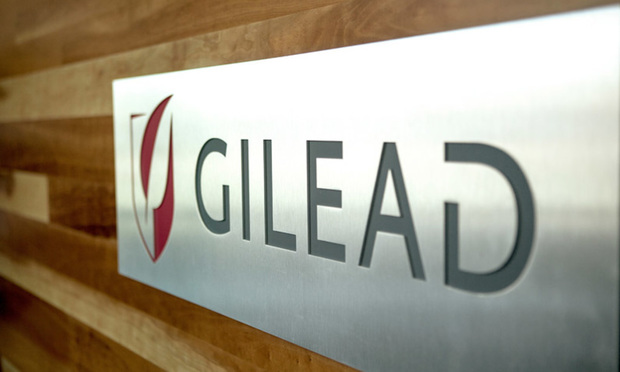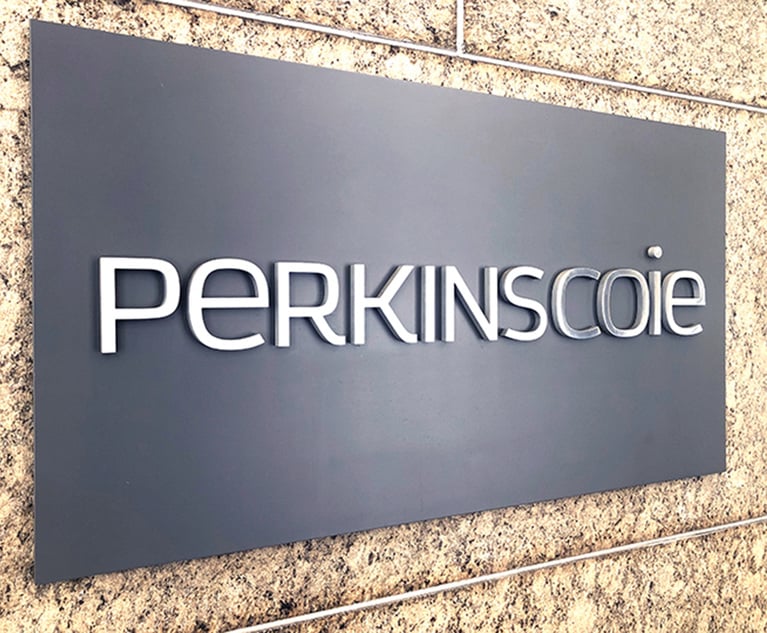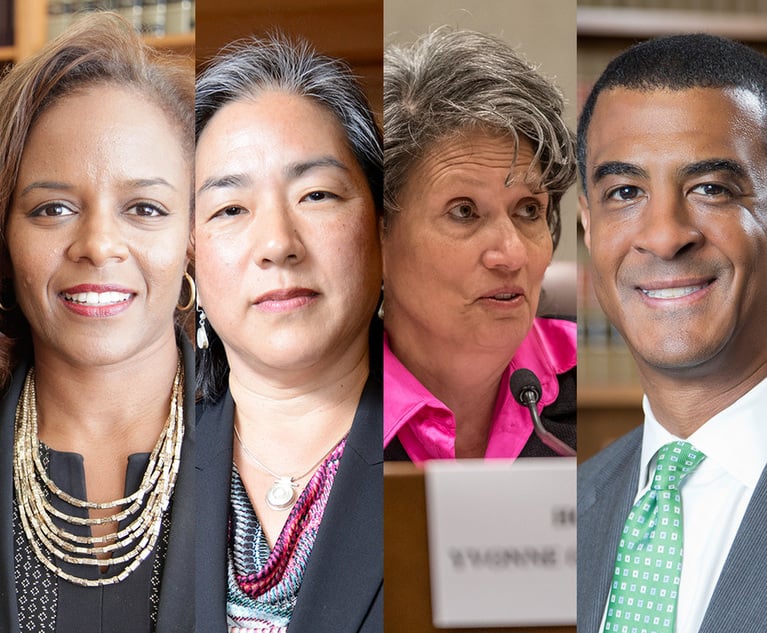Qui Tam Plaintiff Facing Dismissal Bid From Feds in Gilead Case
Lawyers with the DOJ's Civil Division and the U.S. Attorney's Office for the Northern District of California are asking a San Francisco judge to dismiss a long-running lawsuit bringing claims that hundreds of millions of dollars in government funds were spent on adulterated HIV drugs.
July 31, 2019 at 01:00 PM
4 minute read

Whistleblower lawyers are no stranger to facing off against formidable defense teams.
But on Thursday afternoon, lawyers for a pair of qui tam plaintiffs in a long-running False Claims Act suit who claim that Gilead Sciences Inc. improperly received hundreds of millions of dollars in government reimbursements for adulterated HIV drugs will face off against an unusual opponent: Lawyers from the U.S. Department of Justice.
Lawyers with the DOJ's Civil Division and the U.S. Attorney's Office for the Northern District of California are set to ask District Judge Edward Chen to dismiss the long-running lawsuit against Gilead.
“In this matter, the government has a legitimate purpose for dismissal: to avoid the additional expenditure of government resources on a case that it fully investigated and decided not to pursue,” wrote the Justice Department lawyers. Federal investigators, they contend, already reviewed 600,000 documents in the case and considered the allegations raised by the plaintiffs, former Gilead employees Jeff and Sherilyn Campie, that the company used ingredients from an unapproved facility in China. The Food and Drug Administration, they point out, never stopped production at any Gilead facility or pulled any of its drugs from shelves.
Representatives of the Northern District U.S. attorney's office and DOJ's Civil Division declined to comment. But the move comes as part of a string of dismissal requests that government lawyers have made in False Claims Act suits since an influential memo was circulated in January 2018 by Michael Granston, director of the Commercial Litigation Branch of DOJ's Fraud Section. The so-called Granston memo encouraged government lawyers to consider asking for dismissal in cases where the government chose not to intervene on behalf of plaintiffs. The memo pointed out the government might otherwise have to expend significant resources monitoring those qui tam cases, and, if they prove meritless, they could generate precedential decisions that are adverse to the government's interests in future FCA cases.
Lawyers for the Campies at Bonnett, Fairbourn, Friedman & Balint in Phoenix and the Evans Law Firm in San Francisco contend that the DOJ lawyers have not identified a “valid government purpose” for dismissing the lawsuit or shown a “rational relationship between dismissal and accomplishment of the purpose” as required under Ninth Circuit precedent. They point out that the government has identified “conserving scarce resources” as its stated purpose for forgoing hundreds of millions of dollars in potential FCA claims without presenting any cost-benefit analysis or presenting any facts that would allow the judge to do his own analysis. The Ninth Circuit, they point out, revived the lawsuit in 2017 finding that Gilead's claims, seeking payment for noncompliant drugs, were a basis for liability under the FCA. The government lawyers previously hadn't taken a position on the merits, the plaintiffs lawyers note, until an “abrupt change of course” while Gilead's petition for certiorari in the case was pending at the U.S. Supreme Court.
The plaintiffs lawyers wrote that “there is no rational justification for the Government's abrupt, about-face decision to exonerate Gilead from FCA liability on the heels of the Ninth Circuit success and in light of its own investigative findings.”
Bonnett Fairbourn's Andrew Friedman didn't immediately respond to a request for comment, and neither did Ethan Posner of Covington & Burling, who represents Gilead in the case.
But Eric Havian of Constantine Cannon, who regularly represents qui tam plaintiffs in whistleblower suits, said that the case is illustrative of the DOJ's changing approach to qui tam cases. Where the DOJ has had the authority to ask for dismissal, Havian said that the number of government dismissal motions has gone up dramatically in the time since the Granston memo's release—more in the time since the memo than in all the years prior in his estimation.
Havian said that there's a developing split between circuits such as the D.C. Circuit, which is deferential to the government's requests for dismissal, and the Ninth Circuit where the government must at least make a minimal showing of some legitimate government interest for dismissal.
“There's definitely a conflict that's brewing in the courts that will soon percolate up to the Supreme Court,” Havian said.
This content has been archived. It is available through our partners, LexisNexis® and Bloomberg Law.
To view this content, please continue to their sites.
Not a Lexis Subscriber?
Subscribe Now
Not a Bloomberg Law Subscriber?
Subscribe Now
NOT FOR REPRINT
© 2025 ALM Global, LLC, All Rights Reserved. Request academic re-use from www.copyright.com. All other uses, submit a request to [email protected]. For more information visit Asset & Logo Licensing.
You Might Like
View All
Judge Grills DOJ on Trump’s Birthright Citizenship Executive Order

Perkins Coie Backs Challenge to Trump's Ban on Transgender Military Service
4 minute read
Dissenter Blasts 4th Circuit Majority Decision Upholding Meta's Section 230 Defense
5 minute read
‘Listen, Listen, Listen’: Practice Tips From Judges in the Oakland Federal Courthouse
Trending Stories
- 1ACC CLO Survey Waves Warning Flags for Boards
- 2States Accuse Trump of Thwarting Court's Funding Restoration Order
- 3Microsoft Becomes Latest Tech Company to Face Claims of Stealing Marketing Commissions From Influencers
- 4Coral Gables Attorney Busted for Stalking Lawyer
- 5Trump's DOJ Delays Releasing Jan. 6 FBI Agents List Under Consent Order
Who Got The Work
J. Brugh Lower of Gibbons has entered an appearance for industrial equipment supplier Devco Corporation in a pending trademark infringement lawsuit. The suit, accusing the defendant of selling knock-off Graco products, was filed Dec. 18 in New Jersey District Court by Rivkin Radler on behalf of Graco Inc. and Graco Minnesota. The case, assigned to U.S. District Judge Zahid N. Quraishi, is 3:24-cv-11294, Graco Inc. et al v. Devco Corporation.
Who Got The Work
Rebecca Maller-Stein and Kent A. Yalowitz of Arnold & Porter Kaye Scholer have entered their appearances for Hanaco Venture Capital and its executives, Lior Prosor and David Frankel, in a pending securities lawsuit. The action, filed on Dec. 24 in New York Southern District Court by Zell, Aron & Co. on behalf of Goldeneye Advisors, accuses the defendants of negligently and fraudulently managing the plaintiff's $1 million investment. The case, assigned to U.S. District Judge Vernon S. Broderick, is 1:24-cv-09918, Goldeneye Advisors, LLC v. Hanaco Venture Capital, Ltd. et al.
Who Got The Work
Attorneys from A&O Shearman has stepped in as defense counsel for Toronto-Dominion Bank and other defendants in a pending securities class action. The suit, filed Dec. 11 in New York Southern District Court by Bleichmar Fonti & Auld, accuses the defendants of concealing the bank's 'pervasive' deficiencies in regards to its compliance with the Bank Secrecy Act and the quality of its anti-money laundering controls. The case, assigned to U.S. District Judge Arun Subramanian, is 1:24-cv-09445, Gonzalez v. The Toronto-Dominion Bank et al.
Who Got The Work
Crown Castle International, a Pennsylvania company providing shared communications infrastructure, has turned to Luke D. Wolf of Gordon Rees Scully Mansukhani to fend off a pending breach-of-contract lawsuit. The court action, filed Nov. 25 in Michigan Eastern District Court by Hooper Hathaway PC on behalf of The Town Residences LLC, accuses Crown Castle of failing to transfer approximately $30,000 in utility payments from T-Mobile in breach of a roof-top lease and assignment agreement. The case, assigned to U.S. District Judge Susan K. Declercq, is 2:24-cv-13131, The Town Residences LLC v. T-Mobile US, Inc. et al.
Who Got The Work
Wilfred P. Coronato and Daniel M. Schwartz of McCarter & English have stepped in as defense counsel to Electrolux Home Products Inc. in a pending product liability lawsuit. The court action, filed Nov. 26 in New York Eastern District Court by Poulos Lopiccolo PC and Nagel Rice LLP on behalf of David Stern, alleges that the defendant's refrigerators’ drawers and shelving repeatedly break and fall apart within months after purchase. The case, assigned to U.S. District Judge Joan M. Azrack, is 2:24-cv-08204, Stern v. Electrolux Home Products, Inc.
Featured Firms
Law Offices of Gary Martin Hays & Associates, P.C.
(470) 294-1674
Law Offices of Mark E. Salomone
(857) 444-6468
Smith & Hassler
(713) 739-1250






